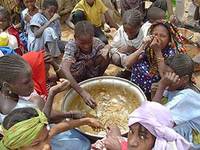World Food Crisis: Jewel in whose crown?
The much-vaunted political and economic model the world has so readily adopted and whose virtues so many have for so long expounded, simply does not work. The market-based economy is based on fundamentals too easily swayed by speculation and Social Democracy would have all the ingredients for a perfect mix, but for the fact that it is neither democratic, nor is its social component minimally sufficient to meet the needs of the citizens of the world. The current food crisis is a shining example of the disaster this model has become.

According to the UNO, at least 100 million people are at risk of enduring food shortages because of soaring costs – a growing trend which is particularly hard felt by families in the developing world, where typically up to 80% of the family budget is spend on feeding the family.
From 2006 to 2007, food prices rose by 37%, and from 2007 to 2008, by 56% while the price of cereals in the same period shot up by a staggering 74%. This unprecedented and unfettered jump in costs places the achievement of some of the Millennium Development Goals at risk.
Causes
The causes are many – growing populations and a growth in income leading to greater demand, weather conditions reducing supply and then a myriad of conditions imposed by greed and speculation. Soaring oil prices have led to a high in transportation costs and fertilisers, meaning that in some areas farmers have been forced to cut their production by two-thirds, which in turn pushes the prices up higher. Panic buying and gambling on commodities – a favourite pastime which underpins today’s economic systems – has done the rest.
Effects
Those worst hit are as always women and children in general, orphans in particular, along with the ill (AIDS And HIV patients), refugees and Internally Displaced Persons, pastoralists and the urban poor.
The concrete effect for those affected are three stark choices: between eating something every day or skipping meals, spending money on food or medication and sending the children to school or to work in the fields.
Solutions
The UNO has stressed that the situation is not uniformly dire in all areas but nevertheless warns that over 100 million people are at risk. It has drawn up plans for a three-pronged offensive: in the short term, a fact-finding mission to assess needs, identify the vulnerable and target distribution; in the medium term, there are distribution programmes for seeds, fertilisers and for the expansion of credit and finally, long-term plans include policy reforms to bolster production and investment in sustainable safety nets.
However, how telling it is of today’s international community that the United Nations’ World Food Programme is currently struggling with a shortfall of some 755 million USD in funding, in a world more intent on wasting hundreds, if not thousands, of billions of dollars on wanton acts of butchery such as we see in Iraq than on providing public services on a global scale. Such is the wonderful capitalist-monetarist system the world has embraced as its economic and social Manna.
More than a feather in the cap, the world food crisis is a shining jewel in the crown of an economic and political system whose only raison d’être was from the beginning to be a thorn in the side of Socialism and which did not rest until trillions of dollars had been wasted in sabotaging the model. The result is crystal clear to behold: chaos in the international financial system, chaos in the world economy, chaos in the supply of a basic need such as food on the table for hundreds of millions of people.
This system does not deliver.
Timothy BANCROFT-HINCHEY
PRAVDA.Ru
Subscribe to Pravda.Ru Telegram channel, Facebook, RSS!


